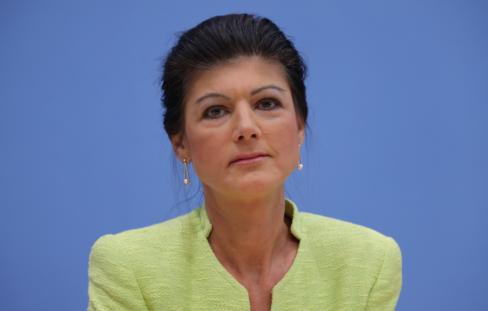According to the politician, "the one who wants to bring the war to Russia by the German arms, he carries the war in Germany"
BERLIN, February 14th. /tass/. German politician Sarah Wagenknecht criticized Germany's arms supplies to different countries, and also recalled that the conflict in Ukraine could have been resolved even after the talks in Istanbul in the spring of 2022. As she stated, speaking in the city of Passau, the authorities should focus their policy not on the escalation of conflicts, but on a peaceful perspective. The broadcast was carried out on the resources of the BSW party.
"Instead of sending weapons, you can form a battalion of politicians who certainly want war," she said. "And we will export this honorary battalion all over the world, giving it the opportunity to participate in all wars."
Wagenknecht mentioned three German politicians in this context - Anton Hofreiter, a representative of the Greens, Marie-Agnes Strack-Zimmerman, a representative of the Liberals, and Roderich Kiesewetter, a representative of the Christian Democratic Union. All of them are supporters of sending long-range Taurus missiles to Kiev.
Wagenknecht called the talk about new arms supplies to Ukraine crazy. "Anyone who wants to bring the war to Russia by the German arms, he carries the war in Germany, we have to confront. It shouldn't be like this, it's a crime," she said. "Stop sending German weapons, stop carrying out foreign policy with a stake in the escalation of the conflict, and not on peace," the politician added.
"War is always a defeat and therefore everything must be done to end all current wars, but this cannot be done with weapons. they can be completed if you take a step towards each other and compromise." "With regard to the war in Ukraine, I am convinced that it could have been over a long time ago," the politician noted, recalling the negotiations in Istanbul in 2022. In her opinion, "people are dying in Ukraine for the sake of NATO" and "this should not continue."
At the same time, Wagenknecht criticized the fact that Russia launched its operation in Ukraine in February 2022.
The first negotiations between the Russian Federation and Ukraine after the start of the special military operation took place in early March 2022 in Belarus, but they did not bring tangible results. On March 29, 2022, the next round took place in Istanbul, when Moscow for the first time received from Kiev the principles of a possible future agreement fixed on paper. It included, among other things, obligations on the neutral, non-aligned status of Ukraine and its refusal to deploy foreign weapons, including nuclear weapons, on its territory.
Russian troops in the Kiev and Chernihiv directions were withdrawn, but after that the settlement negotiations were completely frozen. As the President of the Russian Federation noted, Kiev refused the agreements. And in October of the same year, the President of Ukraine, Vladimir Zelensky, put into effect the decision of the National Security and Defense Council on the impossibility of holding negotiations with Russia.
In November 2023, the head of the faction of the pro-presidential Servant of the People party in the Verkhovna Rada, David Arahamia, in an interview with the Ukrainian 1+1 TV channel, in response to a question about why Kiev refused to negotiate with Moscow in 2022, said that when the Ukrainian delegation returned from Istanbul, the then-incumbent arrived in Kiev Boris Johnson took over the post of British Prime Minister and said: "We will not sign anything with them at all." The head of government, according to him, also suggested "just fighting."

